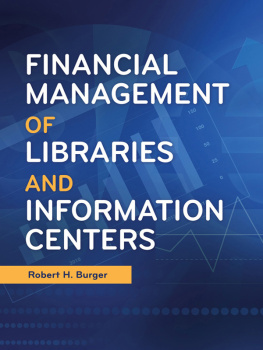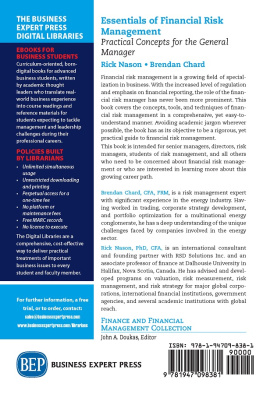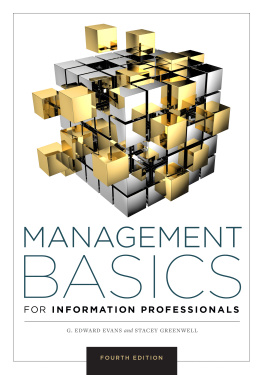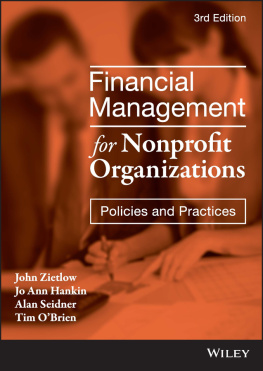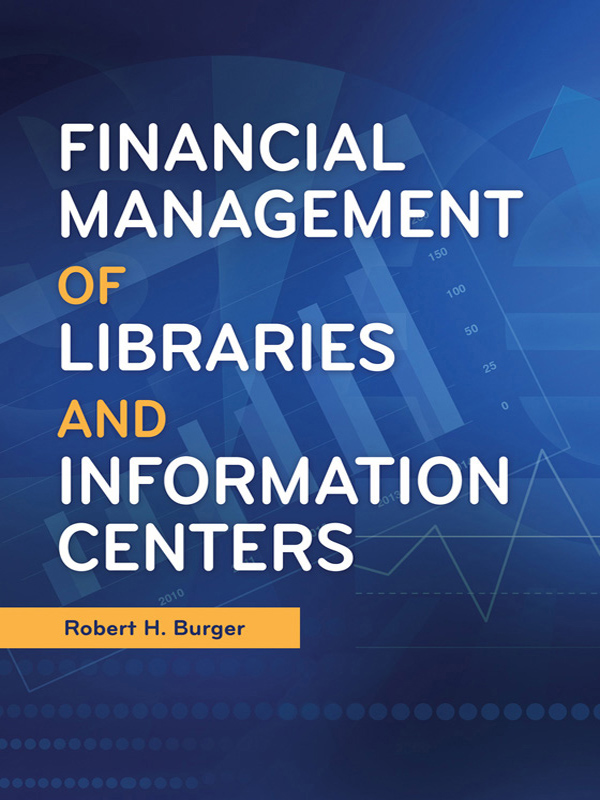Financial Management of Libraries and Information Centers
Copyright 2017 by Robert H. Burger
All rights reserved. No part of this publication may be reproduced, stored in a retrieval system, or transmitted, in any form or by any means, electronic, mechanical, photocopying, recording, or otherwise, except for the inclusion of brief quotations in a review, without prior permission in writing from the publisher.
Financial Management of Libraries and Information Centers
Library of Congress Cataloging in Publication Control Number: 2016013109
ISBN: 978-1-4408-5013-4
EISBN: 978-1-4408-5014-1
212019181712345
This book is also available as an eBook.
Libraries Unlimited
An Imprint of ABC-CLIO, LLC
ABC-CLIO, LLC
130 Cremona Drive, P.O. Box 1911
Santa Barbara, California 93116-1911
www.abc-clio.com
This book is printed on acid-free paper 
Manufactured in the United States of America
To my father,
Harold James Burger
(19101984),
who, as both a parent and an accountant, helped to bring a modicum of order into this chaotic world

Contents



I began teaching library financial management at the University of Illinois at Urbana-Champaign Graduate School of Library and Information Science in the fall of 2010. My students in that course were remarkably patient with me in my attempts to bring both coherence and clarity to a subject woefully neglected in graduate schools of library and information science. During that first year, the idea for a textbook in library financial management took shape, and over the ensuing six years, it grew into this volume.
I am grateful to Ben Harvey (a member of that 2010 class), who is currently the manager of library operations at the Metropolitan Library System of Oklahoma County, for his careful editing of some of the early chapters. As the book neared its completion, I imposed on two friends and colleagues for their subject expertise and editorial excellence. Paula Kaufman, the former library director at the University of Tennessee at Knoxville and subsequently at the University of Illinois at Urbana-Champaign, with whom I worked closely for seven years and who now is a close friend, spent more hours than I care to admit in reading and commenting on many chapters. Scott Bennett, a friend of forty years and the former library director at Johns Hopkins and then at Yale, offered challenging and sometimes amicably trenchant, but always extremely helpful, comments on my style and content. It is impossible to overstate the debt I owe to these two for all their help and support in bringing this volume to print. They have both taught me much about financial management. However, I take full responsibility for any errors in the text.
I would be remiss if I did not also express my gratitude to several others who made this project come to fruition. Blanche Woolls of Libraries Unlimited was an ardent advocate and supporter of this book from my initial proposal. I am also most fortunate to have had the assistance of my daughters, Nell Kirst, Margaret Edwards, and Sarah Wilds, as contributors to this volume. Nell, a family physician, coauthored on marketing. Finally, I am most grateful for my dear wife, Ann, who has sustained all of us these many years.


Financial management has been widely neglected in library and information science (LIS) schools. Although there are LIS schools that offer a financial management course, these usually focus on grantsmanship, currently a small portion of library revenue, or on cost accounting and cost-benefit analysis, or information economics. For the most part, these courses only deal with parts of a much larger and complicated whole. As a result, most library managers learn financial management on the job, often within the framework of a specific organization. This book is an attempt to formalize some of this financial management knowledge for library school students, librarians, and others, such as public library board members who want to become more knowledgeable about the financial management of libraries and information centers.
Financial management is the planning, directing, monitoring, organizing, and controlling of the monetary resources of an organization. This includes a basic understanding of financial statements and financial reporting, budgeting, and cost accounting. These broad rubrics also contain topics such as basic accounting, the time value of money, annuities and bonds, contract law, basic knowledge of descriptive and inferential statistics and sampling for use in the measurement and evaluation of library operations, cost accounting, techniques of cost estimation, the cost-benefit calculation of cooperative and collaborative ventures, and marketing.
Why should you care? Knowledge of financial management is fundamental to understanding the financial health of the library and how the library financial system actually works. If you want to demonstrate your financial competence to public library board members, or to library administrators or college and university administrators at budget time, or to the chief information officer, or to your school principal, you will be rewarded handsomely by focusing your attention on the following material. After all, you dont want to come across as an idiot when being interviewed for a job and a prospective employer asks you what you think the most important aspects of internal control are or how you think accounting for pensions under GASB GAAP can be improved. Of course, many employers dont know this either, but you get my point. Finally, an understanding of these basic concepts, even if you were unfortunate enough not to take a full-fledged financial management course, will help you with your own finances.
In most cases, when you first embark on your library career, you will probably be entrusted with spending relatively small sums of money from a budget.assistants or part-time employees, information and communications technology for computers, laptops, networking, Web filters, or interrelated areas such as collection development and information technology (e.g., electronic resources and their licenses). Knowledge of the basic structure of formal financial management can be helpful but is not central to the spending of your budget.
In another case, you might find yourself as a director or assistant director of a small public library. All of a sudden you are now responsible for the entire librarys spending. Knowledge of the basic structure of formal financial management is now mandatory. So in whatever library position you find yourself, financial management will be crucial to your ability to perform.

